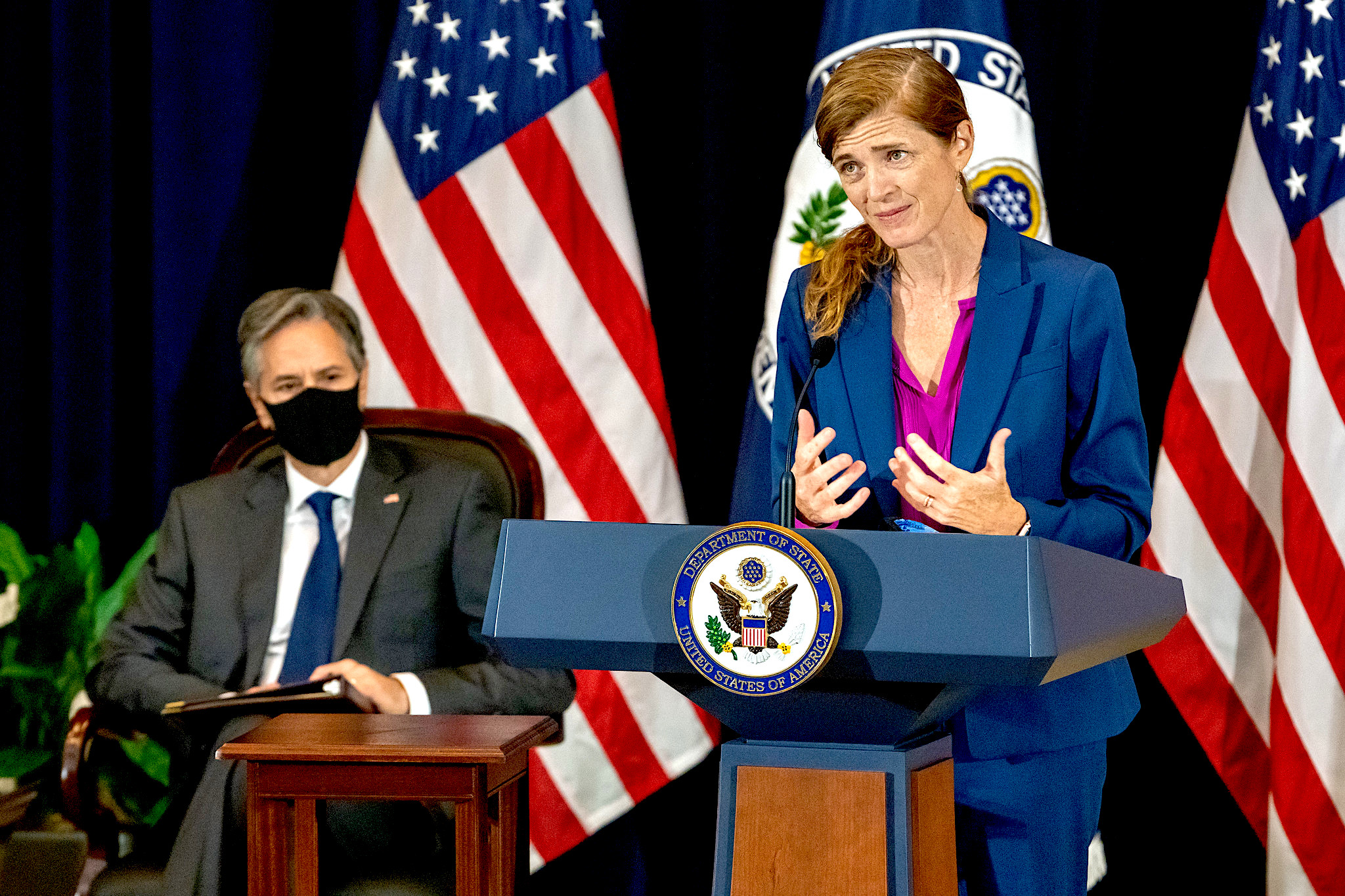Public funding for the anti-Castro industry in the United States seems inexhaustible, writes Rosa Miriam Elizalde.

Oil painting of Fidel Castro at a Revolution Museum in Havana. (U.S. National Archives)
By Rosa Miriam Elizalde
Globetrotter
The piggy bank was rattled again. In September, the United States Agency for International Development (USAID) gave $6,669,000 in grants for projects aimed at “regime change” in Cuba, a euphemism to avoid saying “direct intervention by a foreign power.”
The United States’ current Democratic administration has especially favored the International Republican Institute (IRI) with a bipartisan generosity that Donald Trump never had. Other groups in Miami, Washington and Madrid that have also received generous amounts have been among those calling for an invasion of the island. These groups paint an apocalyptic panorama in Havana to secure greater funding next year.
Public funding for the anti-Castro industry in the United States seems inexhaustible. In the last year, at least 54 organizations have benefited from the State Department, the National Endowment for Democracy (NED) and USAID programs for Cuba.
In the last 20 years, this agency has given Creative Associates International, a CIA front, more than $1.8 billion for espionage, propaganda and the recruitment of agents of “change” including on the island. One of its best-known projects, the so-called Cuban Twitter or ZunZuneo, resulted in a superb failure that unveiled a plot of corruption and flagrant violations of U.S. law. ZunZuneo cost the USAID director his job, but Creative Associates International continues to operate, only now undercover.
State Department ‘Trade Secrets’
The American researcher Tracey Eaton, who for years has followed the route of these funds, commented in a recent interview that many of the financing programs for “regime change” in Cuba are so stealthy that we will probably never know who all the recipients are or what the total amount is, and judging by the known millions, the subsidy must reach an even greater figure.
According to letters from the State Department and USAID that Eaton has received, “democracy-building” strategies are considered “trade secrets” and are exempt from disclosure under the U.S. Freedom of Information Act.

USAID Administrator Samantha Power addressing staff members on Oct. 13. U.S. Secretary of State Antony Blinken is seated behind her. (State Department, Ron Przysucha)
The United States goes berserk at the alleged hint of Russian, Chinese or Islamic intrusion into local politics and online platforms. However, it does not hesitate for a minute to rudely intervene in Cuba, as exposed by the digital daily MintPress News, which documented how private Facebook groups instigated the July 11 riots in several Cuban cities. “The involvement of foreign nationals in the domestic affairs of Cuba is on a level that can scarcely be conceived of in the United States,” says the publication, adding: “the people who sparked the July 11 protests in Cuba are planning similar actions for October and November.”
The United States is a military superpower whose plans for political subversion are a shame and a scandal, and there is no indication that Washington will now achieve what it has failed to do in 60 years. In fact, the U.S. government’s obsession with Cuba is two centuries old, as Louis A. Pérez, a historian at the University of North Carolina at Chapel Hill, has shown in a brilliant essay entitled “Cuba as an Obsessive Compulsive Disorder.”
“The subject of Cuba has rarely been a topic of reasoned disquisition. It defies facile explanation, and certainly cannot be understood solely — or even principally — within the logic of the policy calculus that otherwise serves to inform U.S. foreign relations, mostly because it is not logical,” writes the historian.
What does make sense is the permanence in time of Cuban “intransigence.” Ernesto Che Guevara used to repeat in his speeches in the first years of the 1959 revolution that “Cuba will not be another Guatemala.” In other words, its independence from the U.S. empire could not be boycotted with media bombings first, induced mobilizations and military attacks later.
The custom of overthrowing independent alternatives is so long and the arrogance by an overwhelming military and media force is so blind that the U.S. government has not been able to foresee its continuous defeats nor has it overcome the trauma of having a rebellious island “almost within sight of our shores,” as John Quincy Adams put it, and to top it all, without the slightest interest in being “the state that we lack between the entrance to the Gulf and the exit of the vast Mississippi Valley.”
The great truth of all this, as Louis A. Pérez wisely comments, is that Cubans have learned from history, but Washington has not.
Rosa Miriam Elizalde is a Cuban journalist and founder of the site Cubadebate. She is vice president of both the Union of Cuban Journalists (UPEC) and the Latin American Federation of Journalists (FELAP). She has written and co-written several books including Jineteros en la Habana and Our Chavez. She has received the Juan Gualberto Gómez National Prize for Journalism on multiple occasions for her outstanding work. She is currently a weekly columnist for La Jornada of Mexico City.
This article was produced by Globetrotter.
The views expressed are solely those of the author and may or may not reflect those of Consortium News.

What passes for “policy” by “experts” in state dept towards Cuba is a tragedy.
It is driven by political design in FL or wherever. With the R2P mindless assaults on reason and logic by samantha power, it will not improve, a very unfortunate situation.
I want Cuban cigars, and they won’t let me buy them, dag nab it!
Now..that’s kind of a joke but it’s not.
Here is a true story, close to home: My sister is a horticulturist landscape designer. She purchased a package of kumquat (citrus) seeds from Malaysia? off of ebay. One day two homeland security goons show up at her door asking questions. If that wasn’t silly enough, the same two stasi guys showed up AGAIN. Apparently, we-the-people don’t like that country—I guess?
My first question was: Don’t they have anything better to do?
But… what right do they have to dictate who or where a private citizen can interact with? I don’t have anything against Cubans, or Patagonians, or Mongolians, or anyone else for that matter. I should be able to buy their cigars, or their seeds without interference from a meddling government. It’s none of their business if I want to travel there as well.
In other words; it is only the governments and their sociopathic leaders that don’t get along.
Secret addendum: (don’t tell anyone) Now one of those evil kumquat trees is growing in my greenhouse, and producing little bite-sized fruit. If the goons come knocking, I will simply tell them, “please…dig it up and take it with you.” (it has 2 inch thorns)
Is there any doubt that the US is the greatest force for bad in the world? The US is a fascist capitalist state, and the greatest threat to the rest of the world and itself. The US is it the bottom of all the good lists, and at top of the bad, at least as measured against other developed nations. We need an intervention.
The regime in Washington has been so consistently wrong about what’s likely to happen or what has happened or both for the last 60 years that one wonders why anyone listens to them anymore. Next question. When, if ever, will the US pay a price for our nonstop interference and disruption around the world?
Trump is the price on one hand, our loss of power in the world is the other hand. Both hands are just beginning to feel the thorns. It will become much worse soon.